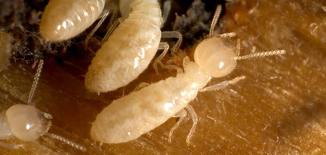Social insects include bees, ants, most wasps and termites. Sociality in insects evolved independently on two different occasions, as termites emerged long before bees, ants and wasps. Individual social insects work cooperatively in order to promote the survival and overall fitness of the colony in which they belong. Social insects, with the exception of the queen, will readily resort to suicide if doing so is necessary to their colony’s welfare. Social insects are also unique for their cooperative problem solving abilities and their competence at creating complicated nests. It is becoming well known that many higher termite species work cooperatively in order to create architecturally complicated nesting mounds.
A social insect colony can be viewed as one superorganism that derives its intelligence from the cooperative activity of its individual termite components. This type of intelligence is known as “swarm intelligence,” and the ability of individual termites to know what is required of them in order to create mounds is known as “swarm cognition.”
Human cognitive abilities can become disordered, which can make learning and carrying out intellectual tasks difficult or impossible. Similarly, the cognitive processes underlying a termite colony’s activity can also become disordered, which often prevents colonies from effectively completing complicated projects, like mound construction. This phenomena has been labeled “swarm cognition disorder” by some researchers.
Research has found that termite colonies can sometimes fail to properly complete tasks that are usually completed rapidly. For example, when a hole forms in a termite mound, worker termites are dispatched to repair the breach. This repair process requires each termite to take cues from other termites in order to know what task should be completed next. Although rare, some colonies have been documented as continuously using excess soil for patching holes in their mounds without ever moving onto the next task in the repair process. Since past research has found that individual termites receive pheromone cues in order to know which task to switch to and when during cooperative projects, it has been theorized that the above described colony cognition disorder is caused by a colony-wide malfunction in pheromone signalling.
Do you believe that the existence of swarm cognition can be inferred from the well established existence of swarm intelligence? Or is more scientific evidence needed in order to substantiate the existence of swarm cognition?

